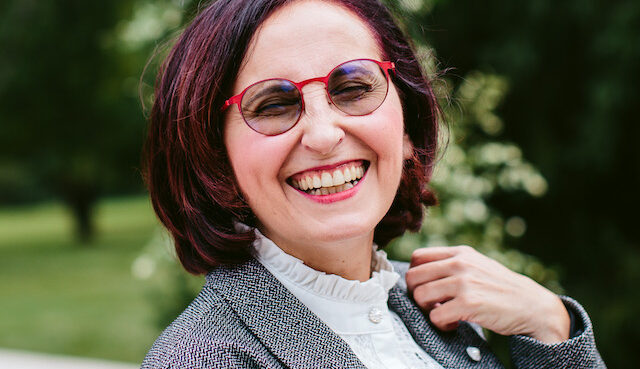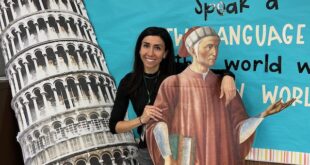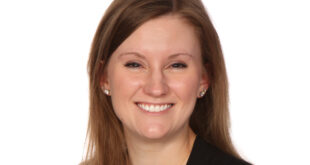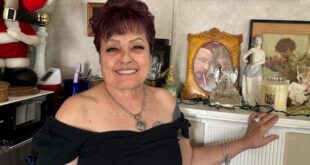Maria Rago’s journey to finding her life’s mission — composing music — started with what most would call a moment of folly.
The Italian pianist and composer was 24-year-old with an Italian literature degree in her native Caltanissetta, Sicily, when she went with a friend to a concert by the cellist Giovanni Sollima. All of a sudden, in the middle of the performance, Rago turned to her friend and declared, “I want to be a musician.”
Astounded, her friend replied, “Come on, be serious,” she recalls. Rago was certain. “I am telling you — that’s what I want to do,” she told her friend.
Fast forward to today, and Rago is a professional composer who lives in Hoffman Estates in suburban Chicago, and boasts a successful musical resume.
Her third CD, expected to be released soon, includes the song “Lady M Day of Hundred Candles,” composed by Rago and performed by soprano Laura Gómez, which earned a 2nd prize in composition at this year’s spring season of the Classical Stars international competition in Warsaw, Poland.
Rago’s works have been performed in festivals and theaters around the world, including The Living Theater in New York; Festival di Spoleto in Italy; Théâtre du Rond-Point in Paris, France; Kleiner Konzertsaal concert hall at the Gasteig in Munich, Germany; Selcuk Ephesus Festival in Turkey; and St. Petersburg International New Music Festival in Russia.
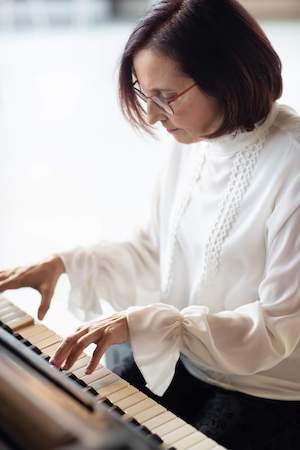 Her compositions have won awards at the Tracks Music Award international contest in Los Angeles, Aphrodite Film Awards in New York and Chi-Town Multicultural Film Festival in Chicago, among others.
Her compositions have won awards at the Tracks Music Award international contest in Los Angeles, Aphrodite Film Awards in New York and Chi-Town Multicultural Film Festival in Chicago, among others.
Rago says she’s especially proud of projects that focus on positive causes and music as a social movement. For example, she collaborated with a dance company in New York in support of the Bronx Dance Fund, and with local representatives of Women for Peace, an organization comprised of Palestinian and Jewish women, for a performance at a studio in Arlington Heights, Illinois.
Back when Rago so unexpectedly decided she wanted to become a musician at age 24, it was her father who suggested she take up the piano.
But at that age, with no musical training and not even able to read notes, Rago had a hard time finding a willing teacher. She finally found one in Lea Cumbo, who told her student she had a month to prove herself. Rago did, and eventually graduated from the Istituto Superiore di Studi Musicali V.Bellini (now Conservatorio Bellini) in Caltanissetta.
Music became her life, Rago says. “To me, it’s the way I am breathing.”
She eventually became enamored with composing and studied with other teachers, including —coincidentally — the cellist’s father, composer Eliodoro Sollima, and at the Conservatoire National Supérieur de Musique et de Danse in Lyon, France.
She left Sicily in 2007 after what she called an “incredible experience” during an early morning performance at the Calatafimi Segesta Festival. “There was the most beautiful sunrise I ever experienced,” she recalls. “With the vibration, with the Sicilian culture and all the emotions, that sun that appeared gave me such a sense of belonging. That was my goodbye to my roots but my welcoming another (set of roots).”
Rago moved to Chicago after meeting her husband, a native of Venice, during a visit to the Windy City while taking a master class at the Manhattan School of Music in New York City.
“We are the example that north and south (of Italy) can work together,” she says, laughing. The couple have a 16-year-old son who once played the trumpet but has since switched to other interests. “He loves music,” Rago says. “That is the most important thing.”
Rago didn’t go back to Sicily until 2016, with her husband and son in tow. “I left with a backpack and came back with a family,” she jokes.
Motherhood entirely shifted her composer’s perspective, Rago says.
“When you’re writing (music), you choose what will be the ending of the story. You have to be careful, because sometimes this process can be very narcissistic,” she says.
Having a child, on the other hand, is an unpredictable and unscripted experience, she says.
“That gave me balance, because I cannot control my real child. I have to love it and let it go and let it experience free will,” she says. “My child gave me another perspective of life. My way of writing completely changed. You listen more. You obey what the notes have to say. You become in tune with what is around you, with listening to what is necessary to tell people with what you write. What story you want to bring.”
“Bringing a new generation that knows how to listen, that is the most important thing,” she adds. “When you listen, you know that diversity is not a problem. That it makes you more rich.”
Rago is currently working on a theatrical piece reflecting on women’s impact on the history of humanity. The piece represents a conversation, mediated by Leonardo da Vinci, between numerous prominent female figures, such as 17th century painter Artemisia Gentileschi and 20th century French philosopher Simone de Beauvoir.
“It’s a metaphorical journey of how women see life,” she explains. “They talk about what the world is doing, what is evolution. Are we changing it or are we in regression?”
 Fra Noi Embrace Your Inner Italian
Fra Noi Embrace Your Inner Italian


